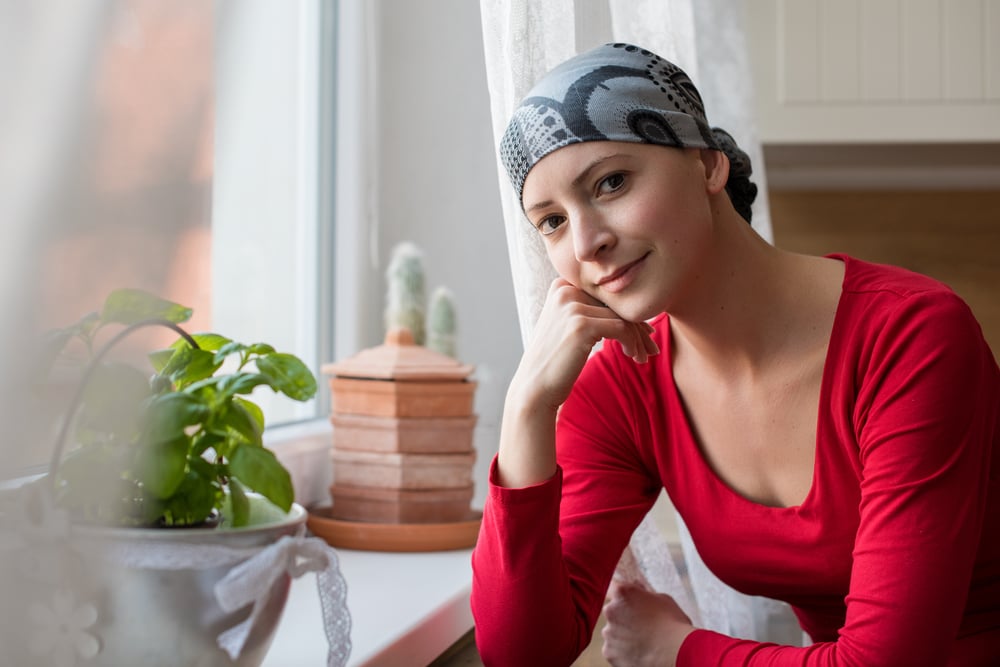Understanding Hair Loss from Breast Cancer Treatment
5 min read

One of the first questions most breast cancer patients ask after receiving their treatment plan is, “Will I lose my hair from treatment?” It’s a valid concern, especially for women. It’s a part of their identity and the thought of losing it can be scary.
Let’s take a look at the various types of breast cancer treatments and which of those are more likely to cause hair loss as a side effect. We’ll also look at what you can do to slow down the hair loss process.
Which Breast Cancer Treatments Result in Hair Loss?
If you’re going to have surgery and receive radiation therapy, with or without hormone therapy or targeted therapy, there’s a good chance your hair won’t fall out! And with breast cancer screening effectively finding breast cancer at earlier stages, this is the case for many women.
Chemotherapy is usually the main culprit of hair loss as a treatment side effect. Chemotherapy kills cancer cells by preventing them from dividing and growing. This also affects healthy cells, such as those found in the hair follicles. This is why chemotherapy commonly causes hair loss.
While not all breast cancer treatment plans include the drugs that typically cause hair loss, there are a few chemotherapies that typically result in hair loss as a common side effect. Breast cancer treatment drugs in the taxane category, including docetaxel and paclitaxel, often result in hair loss as a side effect.
Hair loss from hormone therapy tends to be more mild and spans over a shorter time frame. However, it can sometimes last longer since everyone reacts to treatment differently.
Targeted therapy can cause the hair to thin or fall out. The amount of hair loss you experience will depend on the drug you take. Your treatment team can help prepare you by educating you about the type of targeted therapy you’ll undergo and what side effects to expect.
Immunotherapy is unlikely to cause hair loss. In some instances, it may cause hair to thin or fall out when the specific drug atezolizumab is used.
Radiation therapy kills cancer cells and can also affect healthy cells in the surrounding areas. Radiation therapy does not cause you to lose the hair on your head.
How to Prepare for Hair Loss From Breast Cancer Treatment
It is important to mentally and physically prepare yourself for the potential of hair loss if your treatment plan includes drugs that make it likely. It usually takes a couple rounds of the treatments that lead to hair loss, but you might even notice it starting after one treatment session.
There are a few things you can do to prepare:
- Use a silk pillowcase. This causes less friction on your hair while you sleep which is more comfortable as your scalp becomes more sensitive.
- Get a short haircut. The process of your hair falling out is stressful, and with long hair, it’s even more obvious, which usually makes the process even more distressing. By cutting your hair shorter you will have less hair to fall out and shorter strands when it does. This can also be more comfortable physically for many patients during the hair loss process.
- Purchase a wig before your hair falls out. If you’re going to wear a wig it helps the stylist know what you normally look like, and they can style a wig to match that. Or… if you’d like to have some fun, you can try a new hairstyle with the wig!
- Have hats and/or head scarves handy. Especially during Colorado winters, your head will need to stay covered so you can stay warm! Scarves make it easier to cover your ears, although soft stocking caps can feel good too. Choose something that matches your personality and style.
If you decide that you’re not going to wear any type of head covering, especially on warm days, be sure to protect your scalp by wearing sunscreen. This area of your body typically has some protection from the sun and isn’t used to sun exposure making it likely to burn easily.
Can You Slow Down the Hair Loss Process?
Scalp cooling or cold caps can help to prevent cancer treatment-related hair loss. This involves wearing a tight-fitting hat on your head that has a cold gel or liquid coolant. By keeping the scalp cold during your chemotherapy infusions, blood flow to the scalp area is restricted. This helps reduce how much chemotherapy reaches those cells. With less exposure to the drugs, your hair follicles are less likely to be damaged.
When using a scalp cooling system, you’ll wear a scalp cooling cap each time you have a chemotherapy infusion. Typically, you will wear it for about two and a half hours total. You may experience mild side effects such as headaches, scalp pain, or feeling chilled. How well a scalp cooling device works will vary depending on a few factors, including the type of chemotherapy that is being used.
Read Chelle’s story about her breast cancer journey and how she managed hair loss.
Does Hair Grow Back?
For most people, their hair grows back after the chemo treatments are complete. The amount of time it will take for hair to grow back varies a lot from person to person. You may start to see some soft fuzz growing back in between chemo cycles (when you have a few weeks off of chemotherapy). Most people start to see some hair growth in the first 3 to 4 weeks following treatment. Then, by about one month to 6 weeks after treatment, you could start to see some real hair growing. It will probably take up to a year for the first 6 inches or so of hair to grow back.
You may notice that your hair is a different texture or even color as it returns. Some people who had straight hair may have wavy or curly hair when it returns.
Remember that hair regrowth looks different for everyone, and it is important to have patience.
Here are some things you can do to help encourage hair regrowth:
- Oils. Certain oils and natural extracts such as aloe vera, coconut oil, rosemary, and tea tree oil work to help moisturize the scalp and increase circulation to help support hair regrowth.
- Massaging the scalp. Massaging the scalp regularly can help to improve circulation and help to boost hair growth. Massage your scalp about 2 times per day using your hands or a scalp massaging device.
- Supplements. Talk to your oncology team about supplements that promote hair follicle health and hair growth. Biotin and collagen may be two supplements that can help your hair and nails rebuild after breast cancer treatments.
Breast Cancer Care in Colorado
If you have been diagnosed with breast cancer and you’re in Colorado, trust the Rocky Mountain Breast Specialists team to guide you through the entire process. We treat more breast cancer patients in Colorado than any other healthcare organization. We will meet and discuss your options for surgery and other treatments, creating a plan that’s personalized just for you.
Our team is also available to give second opinions on treatment plans.
Request an appointment at one of our Breast Specialists locations throughout the Front Range, including Denver, Colorado Springs, and Boulder.

